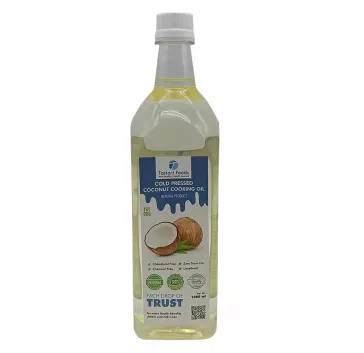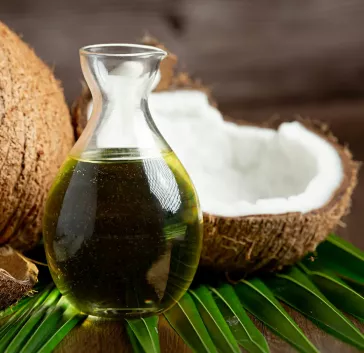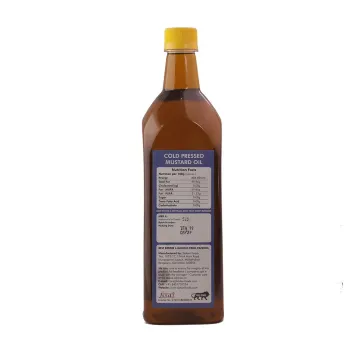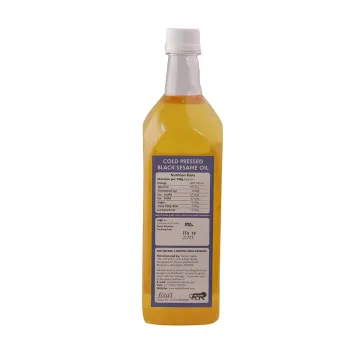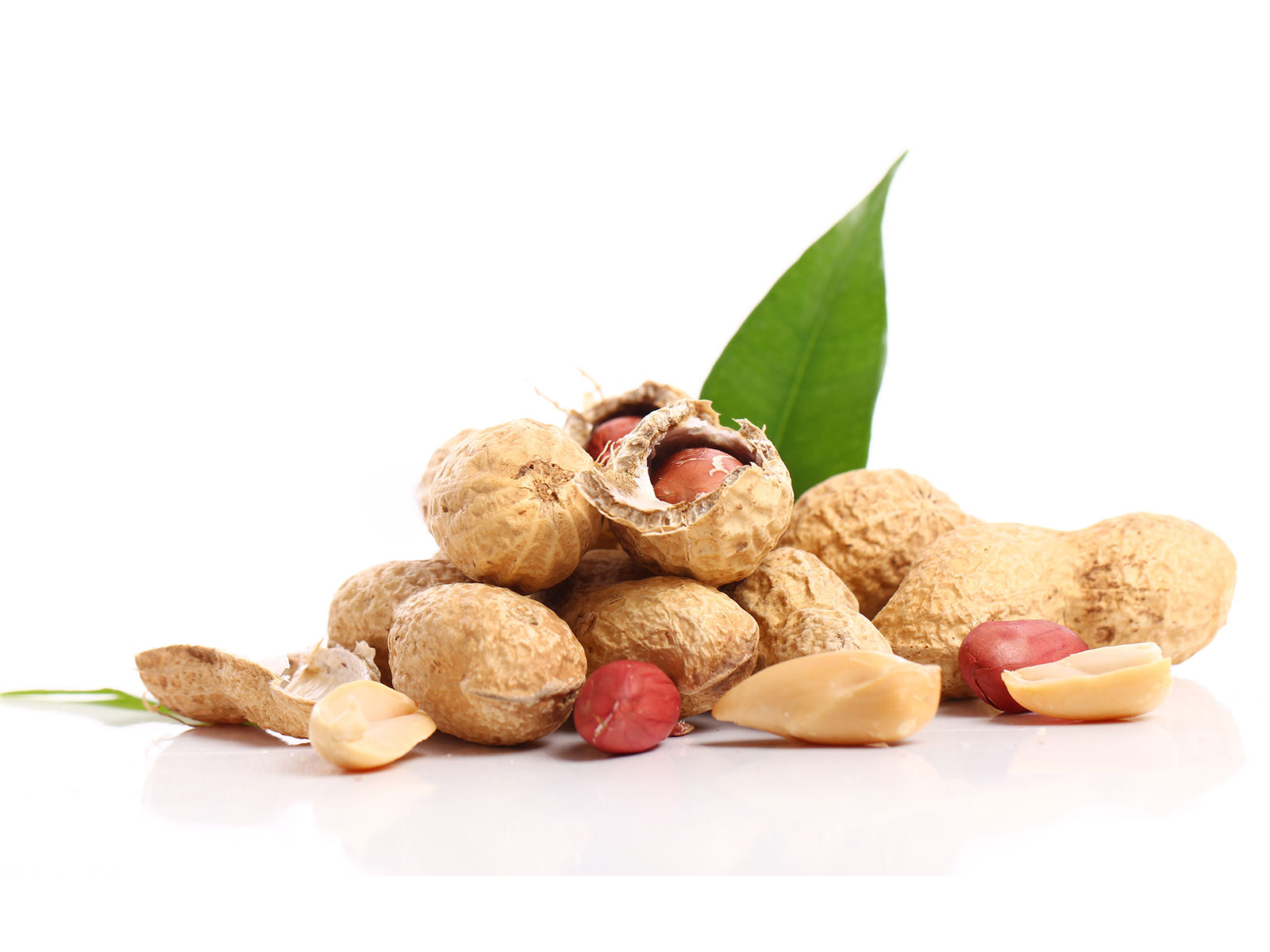
Peanut oil, also referred to as groundnut oil or arachis oil, is a vegetable-derived oil made from the edible seeds of the peanut plant.
Though the peanut plant flowers above ground, the seeds or peanuts actually develop underground. This is why peanuts are also known as groundnuts.
Peanuts are often grouped with tree nuts like walnuts and almonds, but they are actually a type of legume that belongs to the pea and bean family.
Depending on processing, peanut oil can have a wide range of flavors that vary from mild and sweet to strong and nutty.
Peanut oil is widely used around the world but is most common in Chinese, South Asian and Southeast Asian cooking. It became more popular in the United States during World War II when other oils were scarce due to food shortages.
Nutrient Composition
Here is the nutritional breakdown for one tablespoon of peanut oil
- Calories: 119
- Fat: 14 grams
- Saturated fat: 2.3 grams
- Monounsaturated fat: 6.2 grams
- Polyunsaturated fat: 4.3 grams
- Vitamin E: 11% of the RDI
- Phytosterols: 27.9 mg
The fatty acid breakdown of peanut oil is 20% saturated fat, 50% monounsaturated fat (MUFA) and 30% polyunsaturated fat (PUFA).
The main type of monounsaturated fat found in peanut oil is called oleic acid, or omega-9. It also contains high amounts of linoleic acid, a type of omega-6 fatty acid, and smaller amounts of palmitic acid, a saturated fat.
The high amount of omega-6 fats that peanut oil contains may not be a good thing. These fats tend to cause inflammation and have been linked to various health problems.
The considerable amount of monounsaturated fat found in this oil makes it a go-to for frying and other methods of high-heat cooking. However, it does contain a good amount of polyunsaturated fat, which is less stable at high temperatures.
On the other hand, peanut oil is a good source of vitamin E, an antioxidant that has many health benefits like protecting the body from free radical damage and reducing the risk of heart disease.
Potential Benefits of Peanut Oil
Peanut oil is a great source of vitamin E. It has also been linked to some health benefits, including reducing certain risk factors for heart disease and lowering blood sugar levels in people with diabetes.

Just one tablespoon of peanut oil contains 11% of the recommended daily intake of vitamin E. Vitamin E is actually the name for a group of fat-soluble compounds that have many important functions in the body.
The main role of vitamin E is to function as an antioxidant, protecting the body from harmful substances called free radicals. Free radicals can cause damage to cells if their numbers grow too high in the body. They have been linked to chronic diseases like cancer and heart disease.
What’s more, vitamin E helps to keep the immune system strong, which protects the body from bacteria and viruses. It is also essential for red blood cell formation, cell signaling and preventing blood clots. This powerful antioxidant may reduce the risk of heart disease, certain cancers, cataracts and may even prevent age-related mental decline.
In fact, an analysis of eight studies that included 15,021 people found a 17% reduction in the risk of age-related cataract in those with the highest dietary intake of vitamin E compared to those with the lowest intake.

Peanut oil is high in both monounsaturated (MUFA) and polyunsaturated (PUFA) fats, both of which have been researched extensively for their roles in reducing heart disease.
There is good evidence that consuming unsaturated fats can lower certain risk factors associated with heart disease.
For example, high levels of LDL cholesterol and triglycerides in the blood have been linked to a greater risk of heart disease. Many studies have shown that replacing saturated fats with MUFAs or PUFAs may reduce both LDL cholesterol and triglyceride levels.
A large review by the American Heart Association suggests that reducing saturated fat intake and increasing your monounsaturated and polyunsaturated fat intake could lower the risk of heart disease by as much as 30% .
Another review of 15 controlled studies had similar findings, concluding that reducing saturated fats in the diet had no effect on heart disease risk, although replacing some saturated fat with polyunsaturated fat may reduce the risk of heart events.
Yet these benefits were only seen when replacing saturated fats with monounsaturated and polyunsaturated fats. It is unclear if adding more of these fats to your diet without changing other dietary components will have a positive effect on heart health.
Additionally, it is important to note that other major studies have shown little or no effect on heart disease risk when reducing saturated fat or replacing it with these other fats.
For example, a recent review of 76 studies including over 750,000 people found no link between saturated fat intake and the risk of heart disease, even for those with the highest intake.
While peanut oil has a good amount of polyunsaturated fats, there are many other nutritious options that are higher in this type of fat like walnuts, sunflower seeds and flaxseeds.

Peanut Oil Will Improve Insulin Sensitivity
Studies have shown that monounsaturated and polyunsaturated fats will improve blood sugar control in people with diabetes.
Consuming any fat with carbohydrates helps slow the absorption of sugars in the digestive tract and leads to a slower rise in blood sugar. However, monounsaturated and polyunsaturated fats, in particular, will play a bigger role in blood sugar control.
In a review of 102 clinical studies that included 4,220 adults, researchers found that replacing just 5% of saturated fat intake with polyunsaturated fats led to a significant reduction in blood sugar levels and HbA1c, a marker of long-term blood sugar control.
Additionally, replacing saturated fat with polyunsaturated fat significantly improved insulin secretion in these subjects. Insulin helps cells absorb glucose and keeps your blood sugar from getting too high.
Animal studies also suggest that peanut oil improves blood sugar control.
In one study, diabetic rats fed peanut oil experienced significant reductions in both blood sugar levels and HbA1c. In another study, diabetic mice given diets fortified with peanut oil had significant reductions in blood sugar.

Resveratrol in groundnuts, in addition to decreasing blood pressure, also slows down cognitive disorders like dementia and Alzheimer’s disease. Being an antioxidant, it prevents free radicals from breaking down neural pathways in the brain, thus stopping the progress of the disease.

The vitamin E helps maintain good skin health, making it look young and healthy. It prevents premature aging, wrinkles, and marks caused by free radicals.
Potential Health Risks
Although there are some evidence-based benefits to consuming peanut oil, there are also some potential drawbacks.

Omega-6 fatty acids are a type of polyunsaturated fat. They are an essential fatty acid, meaning that you must get them through the diet because your body cannot make them.
Along with the better known omega-3 fatty acids, omega-6 fatty acids play a critical role in proper growth and development, as well as normal brain function.
While omega-3s help fight inflammation in the body that can lead to a number of chronic diseases, omega-6s tend to be more pro-inflammatory.
Although both of these essential fatty acids are crucial to health, modern-day diets tend to be too high in omega-6 fatty acids. In fact, the typical American diet can contain 14 to 25 times more omega-6 fatty acids than omega-3 fatty acids.
Experts suggest that this ratio should be closer to 1:1 or 4:1 for optimal health. Omega-6 intake has skyrocketed over the last few decades, along with rates of inflammatory diseases like heart disease, obesity, inflammatory bowel disease and cancer.
In fact, multiple studies link high intakes of omega-6 fats to an increased risk of breast cancer in women.
The evidence supporting a link between the heavy consumption of these pro-inflammatory fats and certain diseases is strong, though it should be noted that the research is ongoing.
Peanut oil is very high in omega-6s and lacks omega-3s. In order to eat a more balanced ratio of these essential fatty acids, limit intake of oils high in omega-6s, such as peanut oil.
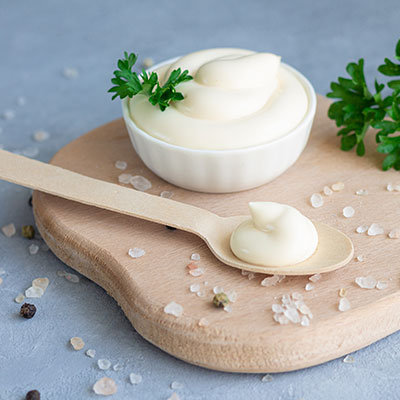
Oxidation is a reaction between a substance and oxygen that causes free radicals and other harmful compounds to form. This process commonly occurs in unsaturated fats, while saturated fats are more resistant to oxidation.
Polyunsaturated fats are the most susceptible to becoming oxidized due to their higher amount of unstable double bonds.
Simply heating or exposing these fats to air, sunlight or moisture can ignite this undesirable process.
The high amount of polyunsaturated fats in peanut oil, along with its use as a high-heat oil, makes it more prone to oxidation.
The free radicals that are created when peanut oil becomes oxidized can cause damage in the body. This damage may even lead to premature aging, certain cancers and heart disease.
There are other, more stable oils and fats available on the market for high-heat cooking.
These are much more resistant to oxidation than peanut oil. Although peanut oil is advertised for its high smoke point, it may not be the best choice.

